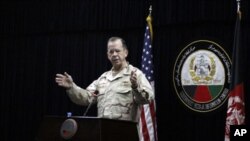The United States' top military officer says the Pentagon must be ready with military options against Iran's nuclear program in the event the president calls for them.
In a document outlining U.S. military assessments and priorities, the chairman of the Joint Chiefs of Staff, Admiral Mike Mullen, said he believes diplomacy offers the best chance to resolve the dispute over Iran's nuclear program.
The admiral added that military action remains an option but that it would have "limited results."
In a television interview broadcast Monday, Iranian President Mahmoud Ahmadinejad dismissed a recent British newspaper report that said Iran is working on a trigger for a nuclear bomb.
Interviewer Diane Sawyer offered Mr. Ahmadinejad a copy of a document obtained by The Times of London which purportedly contained details of Iran's work on the neutron initiator.
The Iranian president waved the document away and said it had been fabricated by the U.S. government.
An advisor to President Obama said Mr. Ahmadinejad's charge is nonsense.
Western nations accuse Iran of seeking to develop a nuclear weapon under the guise of a civilian nuclear program, but Iran insists its program is purely peaceful.
Tehran's chief nuclear negotiator, Saeed Jalili, visited Tokyo Monday to meet with senior officials. A Japanese official said Foreign Minister Katsuya Okada told Jalili he was very concerned about Tehran's nuclear program.
Jalili told reporters that the dropping of an atomic bomb on Hiroshima during World War II was "a crime" that "must never be repeated."
U.S. officials have said Iran will face consequences from the global community if it continues to rebuff efforts to ensure the peaceful application of its nuclear program.
Some information for this report was provided by AFP..




